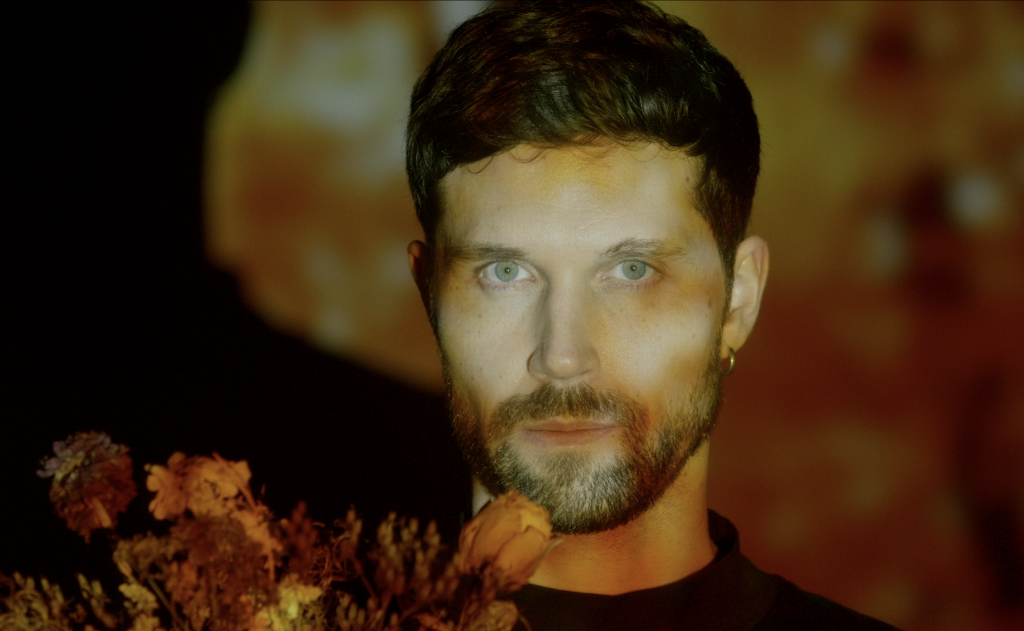
Hello Jannik, thanks for taking the time to talk with us here at Chill. We’ve been loving your debut release ‘Above The Ground’, the first release on your own Liminal Shapes label. For those who are yet to hear it could you tell us about the music and how it came together?
It is my pleasure, thanks for having me and the kind words!
‚Above The Ground‘ is a soundtrack EP that consists of 6 tracks. There are several genres present throughout the EP, certainly elements of ambient music, neoclassic influences but also dancy, tribal electronica and even hints of vaporwave or crisp 80s reminiscent drums.
The EP starts calm and mellow with a melodic synth drone, picks up in tempo and emotion, climaxes in the synth arpeggio and big drums of ‚Adrenaline Rush‘ and dives back into deeper and calmer realms with the closing track.
A Prophet Rev2 Synthesizer builds the core of all songs which then depending on the track get complemented by piano, acoustic guitar, ukulele, handpan, kalimba, own field samples and drum machines or a blend of those.
The running order is designed for taking the listener onto a journey through an ever-changing landscape of varying emotions, tempos and production styles.
One of my main focuses when I produce is to create a constantly evolving stereo image, both in textures as well as dynamics to keep the listener engaged. I’m quite happy how the tracks on this EP turned out.
This project is an accompanying original soundtrack to a documentary about high line wire walking. Could you share with us some more information about this, where the documentary was filmed, who are some of the people involved and where are they from?
The documentary is made by Inbound, a community of like minded athletes and artists that stretches from the East Coast of Quebec to the West Coast of British Columbia founded by Jérôme Ratté-Leblanc and Simon Bernard in 2013. Inbound Movement’s mission is ‚to inspire everyday creativity that generates positive and impactful changes in the world through connecting athletes and artists.
This particular project is called ‚EP3: Coquihalla | The Squamish Highliners’ Journey to 1.1k‘ and follows Jérôme Ratté-Leblanc, Björn Jivung, Jan Blazek, Sean Englund, Taylor St-Germain and other highliners as they tackle the rugged terrain of the Markhor and push their limits in the alpine wilderness of British-Columbia.
How did you end up producing the soundtrack for this documentary?
I met my wife’s cousin Björn Jivung who was based in Squamish and a part of Inbound for the first time in December 2022. He had moved to Sweden for his master studies so he joined the family for Christmas which is when he showed us the raw material of EP3 they had filmed that summer. I thought it was quite special what they were doing and when he showed me previous Episodes I thought the stock music that played in the background wasn’t doing the project justice. It needed something more coherent and more epic.
So I approached him with the idea of creating a soundtrack for the next episode and he immediately liked it. So did Jérôme Ratté-Leblanc and off we went.
It was a mix of synchronicity and creating opportunity.
What is your background in music, the project has a lot of musicality to it, a modern classical feel at points but also very beautiful ambient textures. How did you reach this point of releasing this music which sounds very accomplished?
Thank you!
It may sound funny but my musical journey started (at that time unknowingly) during my later teenage years when I got obsessed with Duran Duran, Tears For Fears and Depeche Mode and grew a Mullet. Their vast catalogues offered a parallel world in which I completely immersed myself in. At that time I started to play bass but it wasn’t until my early/mid-twenties that I really realized there was something deeper and more profound in music that I had to explore. After having studied business and gone through some internships nothing came even close to the gravitational pull that came from creating music.
So I canceled my Masters of Marketing in Australia and moved to Berlin to start over. From 2016 until I’d say 2022 I went through basically every discipline there is to making music (except for mastering) in a self taught manner and through collaborations. Among others, I worked with artists like Dougy Mandagi (The Temper Trap, Bloodmoon) or Amistat who became dear friends and teachers.
Each collaboration offered a new key insight on music creation let it be from a songwriting, production or mixing perspective which I continuously applied to working on and improving my own material.
Then came the ‚Above The Ground‘ EP which was mostly improvisation and following my instincts, watching the footage, listening to the words of the highliners, what they felt while being up there, drafting soundscapes and constantly reworking them until they started to work well with the images. It is a reflection of what I have learned through the years of exploring making music and where I stand today as a producer but also a reflection of my taste as I had completely free hands while creating the EP.
I’m very happy it resonates with you!
What were some of the things you used to produce this material, do you work predominantly in the box or do you have a collection of synthesizers, drum machines, fx units, etc?
At the center of my productions usually stands a DSI Prophet Rev2. I also own a KORG M1 and KORG Wavestation which are known to work well for creating soundtrack music but for this EP I used only the Prophet which then got complemented by my acoustic guitar, baritone ukulele, kalimba, sampled instruments and other recordings from throughout the years. Further sound design and mixing took place mostly digitally in Ableton Live and at that time I had just bought a plugin of the Lexicon 480l digital reverb which helped to give the songs a coherent ‚dimension’.
Once I am satisfied with the overall soundscape and dynamics of a song my studio partner Per Hammar and I usually bounce the stems one more time through his Studer 169 mixing console to give them some warmth and take away that surgical digital precision feel.
A process we call ‚applying analog human love’.
What would you cite as some of the influences for you in the creation of this EP?
It seemed to me that the athletes featured in the documentary understand highlining not just as a recreational activity but as a sort of spiritual practice. Several of them stated that it is about surrendering to the moment and just being present. This is why one focus in terms of production and sound design lay in trying to achieve that trancelike depth and ambience.
Secondly, I wanted the soundtrack to represent the feeling of awe that one gets when watching the footage. Compared to the mountains and the rough wilderness up there we humans are tiny and fragile. So I wanted to give the tracks an underlying feel that can almost be interpreted as ‚dangerous or that we have to be aware and respect these forces‘ but then surround that feeling with beautiful and meditative textures.
I imagined the soundtracks of Blade Runner and Brokeback Mountain to merge and then tried to add a tribal, spiritual dimension to it.
What is next for Jannik Jivung and Liminal Shapes after the release of this project?
Soon my studio partner Per Hammar will have his LP ‚Generation Drive‘ released on Berlin-based Sushitech (‚committed to delving into the deeper dimensions of House and Techno‘) for which got featured on and co-produced two tracks. Those got received so well that we will start producing new material for another release from May after he returns from his DJ tour down under. It’ll be a great summer full of creativity and evening swims after long and focused days at the studio.
Then it is finally time to release the music on which I have been working for so long and share it with the world – by late November/early December I intend to have released LSR002 ‚Liminal Shapes’, a 6-track EP. It’ll have a similar production style to ‚Above The Ground‘ but a little less ‚soundtrack’ and this time you’ll also hear me on vocals.
From late summer/early autumn on I plan to release one single every month accompanied by alternative versions, remixes and music videos.
Moreover, I have already produced and partially mixed 6 of the 8 songs of LSR003, the follow-up album to the ‚Liminal Shapes’ EP which will probably be self-titled ‚JJ‘. The idea is to release one song every month for over a year.
And in my head I have already sketched out the 8 songs for LSR004, no title yet. For those I would like to have featured artists on at least half of the tracks. Of course my dear friend Per Hammar is a desired pick but also other befriended artists such as Amistat or Summerheart come to mind.
I have a long-term vision, it’d be amazing to have you on board for the journey!
You’re a resident of the Swedish city of Malmö, could you tell us a little about your life there, what you do, what are some things you like to enjoy in this city, and any tips of places to check out if we visit?
I have moved to Malmö after having lived in Berlin for five years. What I like best about Malmö is its size – you can cycle through the city within 20 minutes but it never feels too small. Malmö sometimes gets called Sweden’s Berlin, if one wishes a somewhat alternative life in Sweden, Malmö is the place to be. And of course you have a kilometer-long beach in the city and Copenhagen and beautiful nature are just a 30 min train ride away. If you come to visit do so in the summer, there’s plenty to explore and much of it even for free. For instance they have an open-air stage in ‚Pildammsparken‘ one of the several parks of Malmö where you can attend concerts for free for six weeks, it’s called sommarscen‚ ‘summer stage‘.
Another odd favorite is that you can find 60 million year old fossil sea urchins on the beach, looking for them is a summer favorite of mine and the most effective meditation without trying to meditate I know.
I work as much as I can on my music but also as a Barista. Crafting a nice cup of coffee within a minute is a nice balance to working sometimes for month on a song until it is finished. Also I like the idea of serving the community that way and providing a platform for people to take a little time out from the world and just…chill. 😉
Lastly, could you recommend us a personal favourite ‘chill’ album to listen to on this spring?
An album that would qualify for favorite ‚chill‘ recently is Martin Brugger’s ‚Music For Video Stores‘ which I got on vinyl for my birthday. Fantastic work! Fun fact, similar to me on the ‚Above The Ground‘ EP, the only synthesizer Brugger used on that album was a Prophet 08, the predecessor to the Rev2!
Follow Jannik Jivung:


